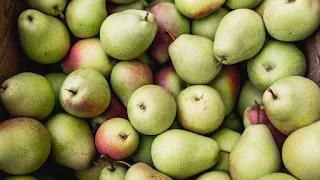| Nutrient | Amount (per medium pear) | % Daily Value |
|---|---|---|
| Calories | 101 | |
| Protein | 1.1g | |
| Fat | 0.3g | |
| Carbohydrates | 27g | |
| Fiber | 6g | |
| Vitamin C | 12% | |
| Vitamin K | 6% | |
| Folate | 5% | |
| Copper | 12% | |
| Vitamin E | 3% | |
| Vitamin B6 | 2% |
Health benefits of pear
Pears are a low-calorie fruit that are high in fiber and vitamins.
Here are some of the potential health benefits of pears
- May aid in digestion: Pears contain high levels of fiber, which can help to keep the digestive system regular and prevent constipation.
- May promote heart health: The fiber, potassium, and vitamin C content of pears may help to lower blood pressure and reduce the risk of heart disease.
- May have anti-inflammatory properties: Pears contain compounds called phytochemicals, which have anti-inflammatory properties and may help to reduce the risk of chronic diseases such as cancer and diabetes.
- May support weight management: Pears are low in calories and high in fiber, which can help to promote feelings of fullness and prevent overeating.
- May have anti-cancer properties: Pears contain a variety of antioxidants and phytochemicals that may have anti-cancer properties.
- Good for hydration: Pears are a good source of hydration, they contain about 84% of water.
Storage methods of pear
Here's some general information on how to store pears in order to keep them fresh:- Room Temperature: If the pears are not yet ripe, you can store them at room temperature. They will ripen over time and become sweeter.
- Refrigeration: Once the pears are ripe, you can store them in the refrigerator to slow down the ripening process. Place them in a plastic bag or container with a lid, but not tightly sealed as pears can give off ethylene, that can cause to overripen them.
- Avoid humid places: Pears should be kept in a cool, dry place, away from damp places.
- Avoid ethylene-producing fruits: Keep them away from fruits that produce ethylene, like apples, bananas, and avocados.
Best time to consume
The best time to consume pears can depend on a few factors, including personal preference and the ripeness of the fruit. Here are a few general guidelines to consider when it comes to consuming pears- Eating as a snack: Pears make a great healthy snack between meals, it can help to reduce your appetite, so you don’t overeat at your next meal.
- As a breakfast: A pear can be a great addition to your breakfast, it can help start your day with a boost of energy and nutrients.
- As a dessert: Pears can make a healthy and delicious dessert. You can eat them as is, or include them in recipes such as pies, cobblers, or tarts
Pear allergies
Pear allergies are not as common as other fruit allergies but it can happen to some people, symptoms of pear allergy can range from mild to severe, and may include- Hives
- Itchy mouth or throat
- Swelling of the face, lips, tongue, or throat
- Abdominal pain
- Nausea
- Diarrhea
- Headaches

